七年级下英语知识点总结
人教版七年级英语下册各知识点归纳总结
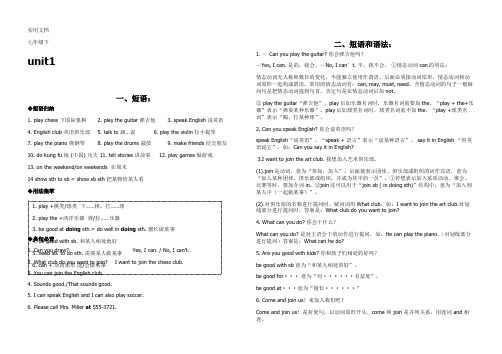
七年级下unit1一、短语:◆短语归纳1. play chess 下国际象棋2. play the guitar 弹吉他3. speak English 说英语4. English club 英语俱乐部5. talk to 跟…说6. play the violin 拉小提琴7. play the piano 弹钢琴8. play the drums 敲鼓9. make friends 结交朋友10. do kung fu 练 (中国) 功夫 11. tell stories 讲故事 12. play games 做游戏13. on the weekend/on weekends 在周末14 show sth to sb = show sb sth 把某物给某人看◆用法集萃◆典句必背1. Can you draw? Yes, I can. / No, I can’t.2. What club do you want to join? I want to join the chess club.3. You can join the English club.4. Sounds good./That sounds good.5. I can speak English and I can also play soccer.6. Please call Mrs. Miller at 555-3721.二、短语和语法:1. — Can you play the guitar? 你会弹吉他吗?—Yes, I can. 是的,我会。
—No, I can’t. 不,我不会。
①情态动词can的用法:情态动词无人称和数目的变化,不能独立使用作谓语,后面必须接动词原形,情态动词和动词原形一起构成谓语。
常用的情态动词有:can, may, must, need。
含情态动词的句子一般疑问句是把情态动词提到句首,否定句是在情态动词后加not。
七年级下册英语必背知识点
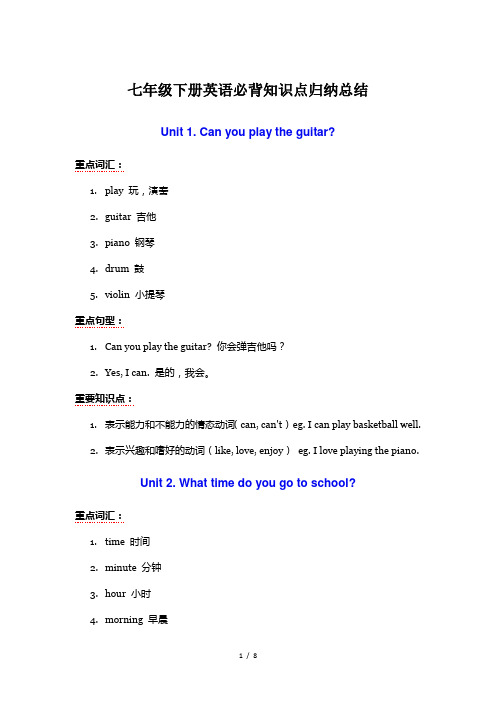
七年级下册英语必背知识点归纳总结Unit 1. Can you play the guitar?重点词汇:1.play 玩,演奏2.guitar 吉他3.piano 钢琴4.drum 鼓5.violin 小提琴重点句型:1.Can you play the guitar? 你会弹吉他吗?2.Yes, I can. 是的,我会。
重要知识点:1.表示能力和不能力的情态动词(can, can't)eg. I can play basketball well.2.表示兴趣和嗜好的动词(like, love, enjoy)eg. I love playing the piano.Unit 2. What time do you go to school?重点词汇:1.time 时间2.minute 分钟3.hour 小时4.morning 早晨5.afternoon 下午6.evening 晚上重点句型:1.What time do you get up? 你几点起床?2.I usually go to school at 7:30. 我通常七点半去上学。
重要知识点:1.表示时间的问答方式和用法eg. What time is it now? It's half past eight.2.表示日常生活习惯的一般现在时eg. I usually do my homework afterschool.Unit 3. How do you get to school?重点词汇:1.bike 自行车2.walk 步行3.bus 公交车4.subway 地铁5.taxi 出租车重点句型:1.How do you get to school? 你怎么去上学?2.I usually take the bus. 我通常坐公交车。
重要知识点:1.表示交通工具的名词和用法eg. I ride a bike to school every day.2.表示方式的副词和表达方式eg. He walks to work every morning.Unit 4. Don’t eat in class.重点词汇:1.don't do sth. 不要做某事2.eat 吃3.drink 喝4.talk 谈话5.listen 听6.music 音乐重点句型:1.Don't talk in class. 上课时不要讲话。
七年级下册英语语法知识点总结(一)
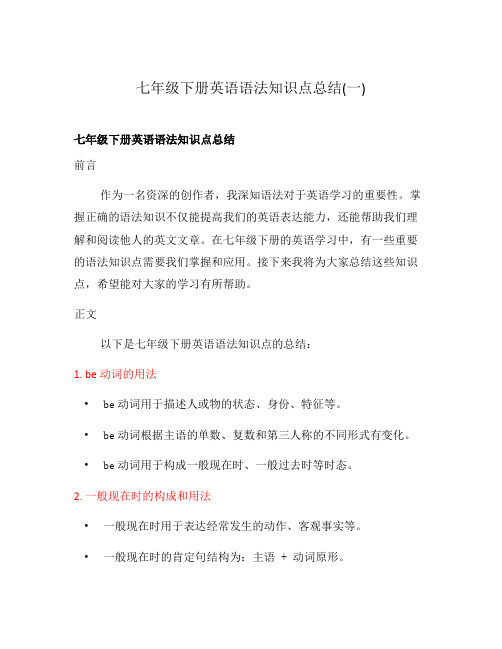
七年级下册英语语法知识点总结(一)七年级下册英语语法知识点总结前言作为一名资深的创作者,我深知语法对于英语学习的重要性。
掌握正确的语法知识不仅能提高我们的英语表达能力,还能帮助我们理解和阅读他人的英文文章。
在七年级下册的英语学习中,有一些重要的语法知识点需要我们掌握和应用。
接下来我将为大家总结这些知识点,希望能对大家的学习有所帮助。
正文以下是七年级下册英语语法知识点的总结:1. be动词的用法•be动词用于描述人或物的状态、身份、特征等。
•be动词根据主语的单数、复数和第三人称的不同形式有变化。
•be动词用于构成一般现在时、一般过去时等时态。
2. 一般现在时的构成和用法•一般现在时用于表达经常发生的动作、客观事实等。
•一般现在时的肯定句结构为:主语 + 动词原形。
•一般现在时的否定句结构为:主语 + do/does + not + 动词原形。
•一般现在时的疑问句结构为:Do/Does + 主语 + 动词原形 + 其他?3. be动词在一般现在时的用法•be动词在一般现在时的肯定句结构为:主语 + am/is/are。
•be动词在一般现在时的否定句结构为:主语 + am/is/are + not。
•be动词在一般现在时的疑问句结构为:am/is/are + 主语 + 其他?4. 一般过去时的构成和用法•一般过去时主要用于描述过去发生的动作或状态。
•一般过去时的肯定句结构为:主语 + 动词过去式。
•一般过去时的否定句结构为:主语 + did not + 动词原形。
•一般过去时的疑问句结构为:Did + 主语 + 动词原形 + 其他?5. be动词在一般过去时的用法•be动词在一般过去时的肯定句结构为:主语 + was/were。
•be动词在一般过去时的否定句结构为:主语 + was/were not。
•be动词在一般过去时的疑问句结构为:Was/Were + 主语 + 其他?•一般将来时用于描述将来要发生的动作或事件。
七年级下册英语语法知识点归纳总结
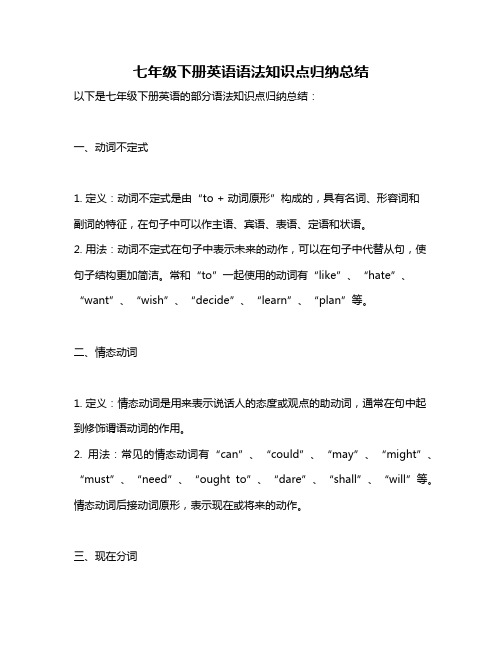
七年级下册英语语法知识点归纳总结以下是七年级下册英语的部分语法知识点归纳总结:一、动词不定式1. 定义:动词不定式是由“to + 动词原形”构成的,具有名词、形容词和副词的特征,在句子中可以作主语、宾语、表语、定语和状语。
2. 用法:动词不定式在句子中表示未来的动作,可以在句子中代替从句,使句子结构更加简洁。
常和“to”一起使用的动词有“like”、“hate”、“want”、“wish”、“decide”、“learn”、“plan”等。
二、情态动词1. 定义:情态动词是用来表示说话人的态度或观点的助动词,通常在句中起到修饰谓语动词的作用。
2. 用法:常见的情态动词有“can”、“could”、“may”、“might”、“must”、“need”、“ought to”、“dare”、“shall”、“will”等。
情态动词后接动词原形,表示现在或将来的动作。
三、现在分词1. 定义:现在分词是动词的一种形式,具有形容词的特征,可以表示正在进行的动作或状态。
2. 用法:现在分词可以作定语、表语和状语。
常和“-ing”一起使用的动词有“seeing”、“feeling”、“thinking”、“doing”、“being”等。
四、介词短语1. 定义:介词短语是由介词和名词或代词构成的短语,用来表示时间、地点、方式等。
2. 用法:介词短语在句子中可以作状语、定语和表语。
常见的介词有“in”、“on”、“at”、“for”、“with”、“by”等。
五、连词1. 定义:连词是用来连接两个句子或从句的词语,表示它们之间的关系。
2. 用法:常见的连词有“and”、“but”、“or”、“so”、“because”、“if”等。
连词在句子中起到承上启下的作用,使句子的意思更加清晰。
以上是七年级下册英语的部分语法知识点归纳总结,希望对你有所帮助。
人教版七年级英语下册单元知识点总结(全册)
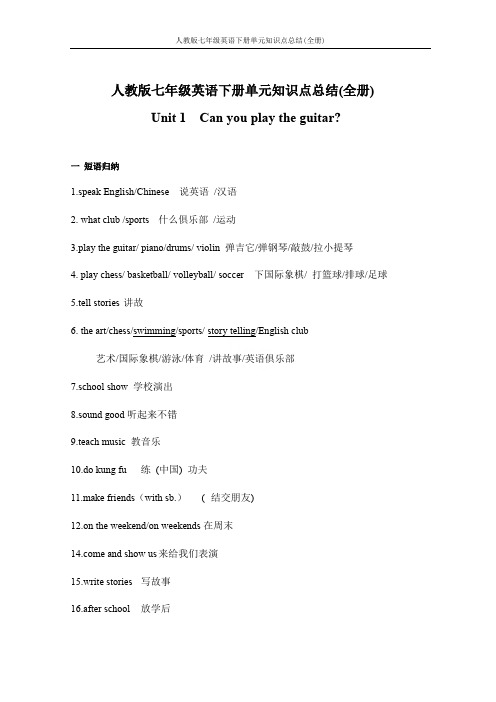
人教版七年级英语下册单元知识点总结(全册)Unit 1 Can you play the guitar?一短语归纳1.speak English/Chinese 说英语/汉语2. what club /sports什么俱乐部/运动3.play the guitar/ piano/drums/ violin 弹吉它/弹钢琴/敲鼓/拉小提琴4. play chess/ basketball/ volleyball/ soccer 下国际象棋/ 打篮球/排球/足球5.tell stories讲故6. the art/chess/swimming/sports/ story telling/English club艺术/国际象棋/游泳/体育/讲故事/英语俱乐部7.school show 学校演出8.sound good听起来不错9.teach music 教音乐10.do kung fu练(中国) 功夫11.make friends(with sb.)(结交朋友)12.on the weekend/on weekends在周末e and show us来给我们表演15.write stories写故事16.after school放学后17.English-speaking students说英语的学生18.play games 做游戏19.the Students’ Sports Center学生运动中心20.at the old people’s home在老人之家21.be in our school music festival 参加学校音乐节22.jion the music club加入音乐俱乐部二用法集萃1. play +棋类/球类下……棋,打……球2. play the +乐器弹/拉……乐器3. be good at doing sth.擅长做某事be good for.. 对… 有好处be good /kind to … 对… 友好4. be good with sb. 和某人相处地好; 善于应付(处理)…5. need(sb./sth.)to do… 需要(某人/某物)做….6. can + 动词原形能/会做某事7. a little + 不可数名词: 一点儿……9. like to do sth.或like doing sth. 喜欢做某事10.want to do…想做……11.What about…?…怎么样?(后面接Ving/代词/名词)12. talk用法: talk to/with sb. 跟某人说话talk about sth. 谈论某事tell 用法:tell sb sth. 告诉某人某事tell sb to do sth 告诉某人去做某事tell stories 讲故事say用法:say直接加说话的内容/itspeak用法:speak +语言13.help sb. with sth在某方面帮助某人= help sb.(to)do sth14.be free /busy有空/很忙15. call sb. at+号码拨打某人的……号码16. be in=join …成为…中的一员(P6)17.want …for the school show为学校表演招聘……三典句必背1. Can you draw? 你会画画吗?Yes, I can. / No, I can’t.是,我会。
七年级英语重点下册知识点归纳
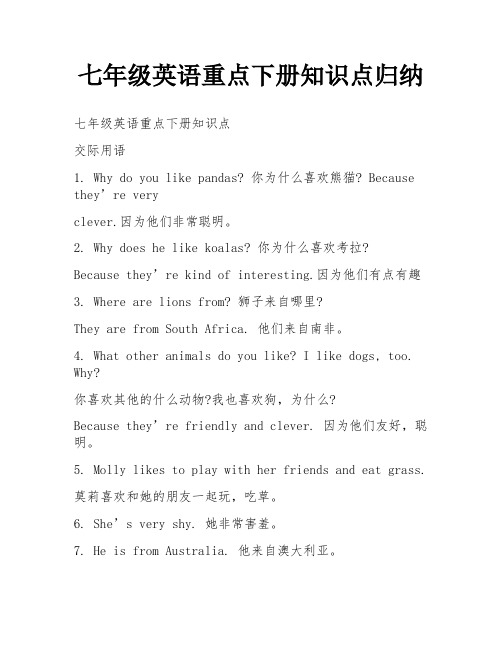
七年级英语重点下册知识点归纳七年级英语重点下册知识点交际用语1. Why do you like pandas? 你为什么喜欢熊猫? Because they’re veryclever.因为他们非常聪明。
2. Why does he like koalas? 你为什么喜欢考拉?Because they’re kind of interesting.因为他们有点有趣3. Where are lions from? 狮子来自哪里?They are from South Africa. 他们来自南非。
4. What other animals do you like? I like dogs, too. Why?你喜欢其他的什么动物?我也喜欢狗,为什么?Because they’re friendly and clever. 因为他们友好,聪明。
5. Molly likes to play with her friends and eat grass.莫莉喜欢和她的朋友一起玩,吃草。
6. She’s very shy. 她非常害羞。
7. He is from Australia. 他来自澳大利亚。
8.He sleeps during the day, but at night he gets up and eatsleaves.他白天睡觉,但是晚上他会起来吃叶子。
9.He usually sleeps and relaxes 20 hours every day.他通常每天睡觉休息20个小时。
10.Let’s see the pandas first. 让我们先看熊猫。
11.Why do you wantto see the lions?你为什么想去看狮子七年级英语重点下册知识点总结一. 动词be(is,am,are)的用法我(I)用am, 你(you)用are,is跟着他(he)、她(she)、它(it)。
七年级下册英语知识点归纳总结
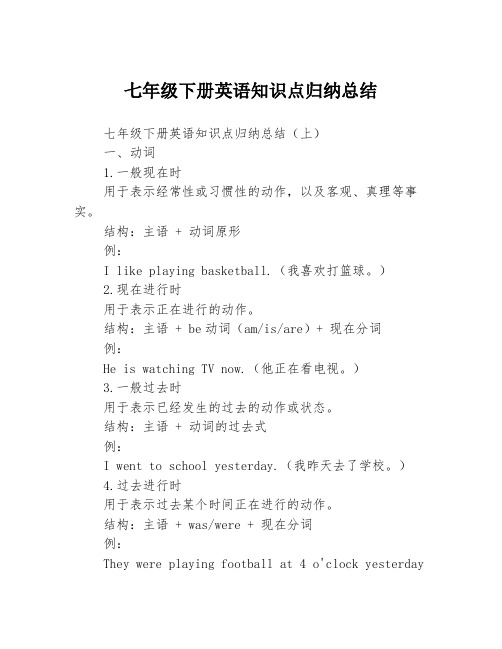
七年级下册英语知识点归纳总结七年级下册英语知识点归纳总结(上)一、动词1.一般现在时用于表示经常性或习惯性的动作,以及客观、真理等事实。
结构:主语 + 动词原形例:I like playing basketball.(我喜欢打篮球。
)2.现在进行时用于表示正在进行的动作。
结构:主语 + be动词(am/is/are)+ 现在分词例:He is watching TV now.(他正在看电视。
)3.一般过去时用于表示已经发生的过去的动作或状态。
结构:主语 + 动词的过去式例:I went to school yesterday.(我昨天去了学校。
)4.过去进行时用于表示过去某个时间正在进行的动作。
结构:主语 + was/were + 现在分词例:They were playing football at 4 o'clock yesterdayafternoon.(他们昨天下午4点正在踢足球。
)5.将来时用于表示将来某个时间要发生的事情。
结构:主语 + will/shall + 动词原形例:We will have a picnic next Saturday.(我们下周六去野餐。
)二、数词1.基数词表示数量的数字,如:one(1)、two(2)、three(3)等。
2.序数词表示顺序的数字,如:first(第一)、second(第二)、third(第三)等。
3.小数表示不是整数的数。
如:0.5、1.25等。
4.百分数表示百分比的数,如:50%、80%等。
三、名词1.可数名词表示能够用数目进行计算的名词,如:book(书)、student(学生)等。
2.不可数名词表示无法用数目进行计算的名词,如:water(水)、milk(牛奶)等。
3.复数名词表示“多个”的名词。
规则:在词尾加-s。
如:books(书)、students(学生)等。
四、形容词用于修饰名词或代词。
1.形容词的比较级用于表示两者之间的比较。
七年级英语下册单元知识点总结
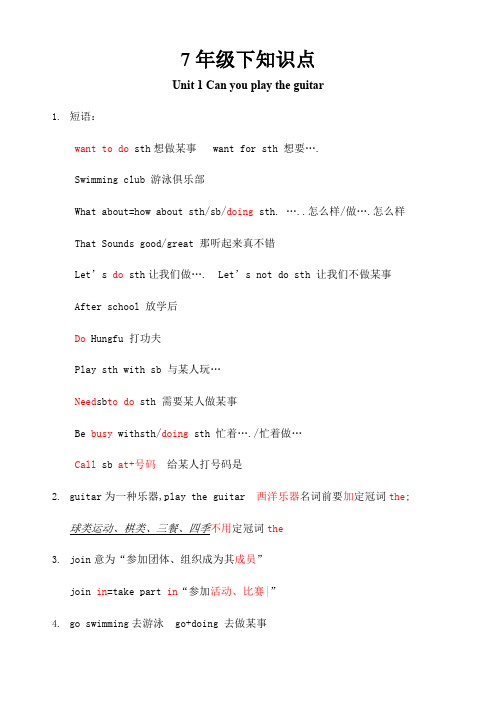
7年级下知识点Unit 1 Can you play the guitar1.短语:want to do sth想做某事 want for sth 想要….Swimming club 游泳俱乐部What about=how about sth/sb/doing sth. …..怎么样/做….怎么样 That Sounds good/great 那听起来真不错Let’s do sth让我们做…. Let’s not do sth 让我们不做某事After school 放学后Do Hungfu 打功夫Play sth with sb 与某人玩…Need sb to do sth 需要某人做某事Be busy withsth/doing sth 忙着…./忙着做…Call sb at+号码给某人打号码是2.guitar为一种乐器,play the guitar 西洋乐器名词前要加定冠词the;球类运动、棋类、三餐、四季不用定冠词the3.join意为“参加团体、组织成为其成员”join in=take part in“参加活动、比赛|”4.go swimming去游泳go+doing 去做某事5.注意区分:speak, say, talk和tella)①say说话 What can you sayb)②speak+语言c)③talk表示两个人或多个人在一起讲话、谈论多指随意谈论talk with sb与某人交谈 talk to sb 向某人说… talk about谈论…;d)④tell的意思是“告诉,讲述,吩咐”,讲故事或讲笑话多用tell;6.Show “表演,演出,出示……给某人看”, show sth. to sb.=show sb. sth.;7.show作名词,意为“展览,展出”on show “在展出” car show 车展;school show 学校公演fashion show 时装表演;a flower show花展8.help sth. 在……方面帮助某人help sth.帮助某人….. help sth.帮助某人干什么;a)I often help him do his homework.b)I often help him his homework.9.be good with... 与……相处得好;与……合得来=get on well withbe good at doing sth擅长做某事 be good for对……有益处;be good to sb 对某人好10.Can you play the guitar你能弹吉他吗情态动词:不能单独做谓语动词;无人称、单复数变化;后接动词原形1.表示能力能;会;如:He can speak English.他会说英语;2.表示许可,意为“可以”,这时可以和may通用,但是比may较正式;如:Can I use your pen我可以用你的钢笔吗3.表示可能性,意为“可能”,这时常出现在否定句中;如:It can’t be true.这不可能是真的;4.表示提供帮助;如:Can you help me你可以帮助我吗1.肯定句:主语+can+动词原形+其他;如:2.否定句:主语+can’t+动词原形+其他;如:3.一般疑问句:Can+主语+动词原形+其他肯定答语:Yes,主语+can.否定答语:No,主语+can’t.如:4.特殊疑问句:疑问词+can+主语+动词原形+其他如:What can I do for you我能为你做点什么呢Unit 2 What time do you go to school1.重点短语:get up 起床 get dressed 穿衣服 get on上车 get off 下车get home到达家中get to work到达工作岗位practice guitar 练吉它 practice doing sth练习做…leave home 离家take a shower = have a shower 洗淋浴澡have/eat breakfast/dinner/lunch 吃早、晚、午饭go to bed 睡觉反义词get upput on 穿衣服反义词take offdo one’s homework 做家庭作业tell sb. about sth. 告诉某人某事love to do = like to do 喜欢干某事 like doing sth at around/about six o’clock 六点左右in the morning/afternoon/evening 在早上/下午/晚上listen to 听…on weekends=at the weekend 在周末on school days 在学校上课日late for… …. 迟到了lots of =a lot of 许多a good /bad habit 好习惯take a walk=have a walk 散步live a happy life 过着幸福的生活2英语时间的表达What is the time 几点了It’s….1直接法:6:10 →six-ten 8:50→eight-fifty6:00 →six o’clocko’clock可省2借助介词to/past分钟数+to/past+小时小于等于30分钟“past” 超过10:15→ a quarter past ten或fifteen past ten 9:30→half past nine或thirty past nine大于30分钟“to”差….到….翻译时要注意时钟要加111:50→ten to twelve9:45→a quarter to ten或fifteen to ten3 what time与when的区别what time “几点”问的是具体的时间,回答要具体到小时;What time do you go to school你什么时候/几点上学when提问,回答既可以是具体的时间,也可以是不具体的时间,如:in the morning,last year,in 1998等范围大的时间;例如:When does he take a shower他什么时候洗澡He takes a shower in the morning.他在早上洗澡;也可用具体时间:I take a shower at 6 o’clock in the morning.我早上六点洗澡;3、 listen to, hear和sound△listen to意为“注意听”,表示有意识地去听,但不一定听得见什么,强调听的动作;They are listening to the teacher. 他们在听老师说;△hear意为“听见”,强调听的结果;如:I’m sorry to hear that.听到那个消息我很难过;△sound意为“听起来,听上去”,可作系动词+形容词The music sounds sweet. 这音乐听起来悦耳;Unit 3 How do you get to school1、重点短语搭配take the subway 乘地铁every day 每天think of 认为 think about 考虑between…and….在…和…之间 next to在旁边come true 实现I think so 我也这样认为I don’t think so 我不这样认为It’s easy /difficult for sb to do sth 对某人而言做什么是很容易/困难的it is easy to get to school到达学校很容易on a ropeway 坐缆索cross the river 穿过河流one 11-year-old boy 一个11岁的男孩红色部分为一个形容词I’m 11years old 我11岁quickly 动作上快 fast 速度上快 soon时间上快the river runs quickly 河水流的快ten minutes’ walk / a ten-minute walk =10 minutes on foot 10分钟的路be afraid to do/ be afraid of sth / doing害怕做某事why not +v原形 == why don’t you +v原形为什么不...........how to do it 怎么来做它what to do 做什么what do you think of =how do you like你觉得怎么样how long does it take sb to do sth花费某人多长时间做某事crossing the river is… 穿过河是…ing型动词做主语谓语动词用单数2、How do you get to school你怎样到达学校交通方式的表达:1 take/ride/drive + a/the +交通工具take a bus/car…2by +交通工具 by bus/car3on/in + a/the +交通工具in:封闭/半封闭/小型工具;on:大型4ride/fly/drive to +交通工具= go to +地点+by+交通工具walk to+地点= go to+地点on foot.eg: I drive to school every day.= I go to school by carI walk to school every day.= I go to school on foot3、spend, cost, pay 与 take区别(1)spendsb spend…on sth或spend…in doing sth.意为“某人花时间/金钱做某事”;eg: I spent 5 dollars on the book.=I spend 5 dollars buying the book.(2)coststh cost sb some money意为“某物花费某人多少钱”;eg: The skirt costs her 200 yuan.(3)paysb pay money for sth.意为“某人为某物付款”;eg: He paid 1000 yuan for the TV set.(4)takeIt takes sb time/ money to do sth.eg: It took him seven days to make the big cake.4、Then the early bus takes him to school.take…to…意为“把…带去…” bring….to….把…带来….5、how far用来提问距离,意为“多远;How far is it from A to B=How far is B from A A 到B有多远①用长度单位表示eg: —— How far is it from your home to the bus stop ——It’s five kilometers.②用时间表示eg: —— How far is the park from the shop——It’s ten minutes’ walk.6、how long 用来提问时间,意为“多久”;eg: —— How long have you been in America—— For two years. for+短时间表示“长达…”7、say, speak, talk与tell8、look, read, see与watch9、there be 句型就近原则There is no bridge=there is not a bride 这儿没有桥◆unit 4 Don’t eat in class.1、重点短语与句型on time准时 in time 及时fight for 为….而斗 fight against 为反对….而战斗 fight with 与…一起战斗go outsider 去外面It’s important for sb to do sth 对…人而言做…是很重要的practice sth/ doing sth 练习…/练习做…do the dishes 清洗餐具make bed 铺床be strict with sb 对某人严格remember/forget to do sth 记得/忘记要做…remember/forget doing sth 记得/忘记做过…follow the rules 遵守规则learn from sb/sth 从…..学习 learn to do sth 学会做某事be late for school 上学迟到have to 不得不don’t have to=needn’t 不必 must 的一般疑问句否定回答school uniform 校服on school nighs 在上学日的晚上too much+不可数名词“太多” too many +可数名词的复数“太多”much too + 形容词/副词“太….”in the kitchen 在厨房let/make/have sb do sth 让某人做某事good luck 好运keep+形容词保持… keep quiet 保持安静=be quietkeepsb doing sth 一直做某事 He keeps me waiting for him a long time. 他让我等了他很久keep sb from doing sth 阻止某人做某事have fun doing sth 很高兴做某事。
初一下册英语知识点总结归纳

初一下册英语知识点总结归纳第一章 Hello! (你好!)1. 问候语:Hello! Hi! Good morning/afternoon/evening! How are you? I'm fine, thank you. And you?2. 家庭成员表达:father, mother, sister, brother, grandfather, grandmother等。
3. 介绍自己:My name is... I am... years old. I am a student. I come from...第二章 Classroom language (教室用语)1. 基本课堂用语:sit down, stand up, open your book, close your book, listen, repeat, read, write等。
2. 数字表达:1-20。
3. 询问问题:What's this/that? What color is it? Is it...? Are they...?第三章 My schoolbag (我的书包)1. 物品名称:book, pen, pencil, ruler, eraser, bag, pencil case等。
2. 形容词:big, small, long, short, tall等。
3. 数量词:one, two, three等。
4. 句型:This is my... These are my...第四章 My classroom (我的教室)1. 教室物品:desk, chair, blackboard, whiteboard, map等。
2. 位置词:in, on, under, behind等。
第五章 My body (我的身体)1. 身体部位:head, eyes, ears, nose, mouth, hand, arm, leg, foot等。
七年级下册英语知识点总结归纳人教版
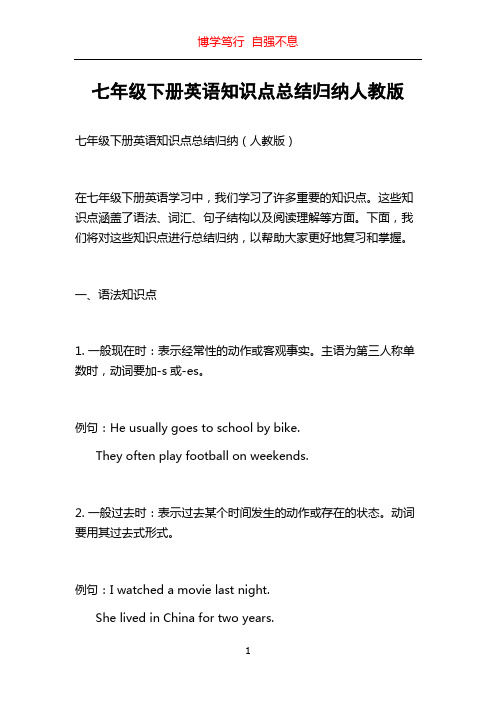
七年级下册英语知识点总结归纳人教版七年级下册英语知识点总结归纳(人教版)在七年级下册英语学习中,我们学习了许多重要的知识点。
这些知识点涵盖了语法、词汇、句子结构以及阅读理解等方面。
下面,我们将对这些知识点进行总结归纳,以帮助大家更好地复习和掌握。
一、语法知识点1. 一般现在时:表示经常性的动作或客观事实。
主语为第三人称单数时,动词要加-s或-es。
例句:He usually goes to school by bike.They often play football on weekends.2. 一般过去时:表示过去某个时间发生的动作或存在的状态。
动词要用其过去式形式。
例句:I watched a movie last night.She lived in China for two years.3. 现在进行时:表示说话时正在进行的动作。
构成:主语+be动词(am, is, are)+动词-ing。
例句:They are playing basketball in the park.We are learning English now.4. 一般将来时:表示将来要发生的动作或存在的状态。
构成:主语+will+动词原形。
例句:I will visit my grandparents next weekend.She will be a doctor in the future.5. 情态动词:can, may, must等,表示能力、许可、必须等。
例句:You can go to the park with us.Students must wear school uniforms.6. 宾语从句:用来充当主句中动词的宾语的从句。
例句:I think that he is a good student.She knows where the nearest supermarket is.二、词汇知识点1. 动词短语:由动词与副词/介词组成的短语。
新人教版七年级英语下册知识点总结

新人教版七年级英语下册知识点总结Unit 1 Can you play the guitar?◆短语归纳1. play chess下国际象棋2. play the guitar弹吉他3. speak English说英语4. English club英语俱乐部5. talk to跟 (6)play the violin拉小提琴7. play the piano弹钢琴8. play the drums敲鼓9. make friends结交朋友10. do kung fu练(中国)功夫11. tell stories讲故事12. play games做游戏13. on the weekend/on weekends在周末◆用法集萃1. play +棋类/球类下……棋,打……球2. play the +西洋乐器弹/拉……乐器3. be XXX.擅长做某事4. be good with sb.和或人相处地好5. need sb. to do sth.需求或人做某事6. can +动词原形能/会做某事7. a little +不成数名词一点儿……8.join the …club插手…俱乐部9. like to do sth. =love to do sth.喜爱/爱好做某事◆典句必背1. Can you draw?Yes, I can. / No, I can’t.2. What club do you want to join?I want to join the chess club.3. You can join the English club.4. XXX.5. I can speak English and I can also play soccer.6. Please call Mrs. Millerat555-3721.Unit 2 What time do you go to school?◆短语归结1. what time几点4. XXX洗淋浴7. do homework做家庭功课2. go to school去上学5. XXX刷牙3.getup起床6.getto到达8. go to work去上班9.XXX回家12.gethome10. XXX吃早饭11. get dressed穿上衣服到家13.either…or…要么…要么…14. go to bed上床睡觉15. XXX在上午/下战书/早晨16. take a walk漫步17. lots of=a lot of很多,大量电台19. XXX在晚上20. be XXX迟到◆用法集萃1. at +详细工夫点在几点(几分)2. XXX/XXX吃早饭/午饭/晚饭3. XXX基数词……点半4. XXX基数词差一刻到……点处置……举动5. take a/an +名词- 1 -6.从……到……from …to …7. need to do sth需要做某事18.XXX◆典句必背XXX.3. When do students usually eat dinner?They usually eat XXX XXX.4. In the evening, I either watch TV or play computer games.5. At twelve, XXX..6.She knows it’s not good for her, but it tastes good.7. Here are your XXX.◆短语归结1. get to school抵达黉舍2. take the XXX乘地铁3.XXX骑自行车4. how far多远5. from home to school从家到学校6.every day每天7. take the bus乘公共汽车8. by XXX骑自行车9.busstop 公共汽车站10. think of认为11.between … and …在…和…之间12. one 11-year-old boy一个11岁的男孩13.play with …和…玩14. come true完成15. have to不能不◆用法集萃1.take… to …= go to … by…乘…去…2. How do / does(sb)get to …?…是如何到…的?3.How far is it from … to …?从…到…有多远?4. It takes sb. some time to do sth.做某事破费或人多长工夫。
七年级下册英语知识点归纳总结

七年级下册英语知识点归纳总结一、词汇与短语1. 学校科目:Math, Science, History, Geography, English, Chinese, Art, Music, PE (Physical Education)2. 学校设施:Library, Canteen, Gym, Playground, Computer lab, Auditorium3. 常见动词:Play, Sing, Dance, Draw, Read, Write, Listen, Speak, Think4. 常见形容词:Big, Small, Happy, Sad, Tall, Short, Young, Old, Beautiful, Ugly5. 日常活动:Get up, Brush teeth, Take a shower, Eat breakfast, Go to school, Have classes, Do homework, Watch TV, Go to bed6. 常见名词:Book, Pen, Pencil, Eraser, Notebook, Teacher, Student, Parent, Friend7. 常见介词:In, On, Under, Behind, Between, Next to, Across from, Above, Below8. 常见副词:Quickly, Slowly, Carefully, Loudly, Quietly, Well, Badly, Often, Never二、语法要点1. 时态- 一般现在时:表示经常发生的动作或状态,如:I usually play soccer on weekends.- 一般过去时:表示过去某一时间发生的动作或状态,如:He visited his grandparents last weekend.- 一般将来时:表示将来某一时间将要发生的动作,如:Theywill go on a trip next month.2. 代词- 人称代词主格:I, You, He, She, It, We, They- 物主代词:My, Your, His, Her, Its, Our, Their- 反身代词:Myself, Yourself, Himself, Herself, Itself, Ourselves, Themselves3. 冠词- 不定冠词:A, An (用于单数可数名词前)- 定冠词:The (用于特指的人或物前)4. 介词短语- 表示时间:At + 时间点 (at 8:00), On + 具体日期 (on Monday)- 表示地点:In + 大地方 (in the library), At + 小地方 (at the bus stop)5. 简单句和并列句- 简单句:只有一个主谓结构的句子,如:The dog barks.- 并列句:用并列连词连接的两个或多个简单句,如:She is smart and she works hard.6. 情态动词- Can, Could: 表示能力或许可,如:Can you help me? Could you open the window?- May, Might: 表示可能性,如:It might rain later.- Must, Have to: 表示必须,如:You must do your homework. We have to go now.三、阅读理解技巧1. 快速浏览(Skimming):快速阅读文章,抓住主旨大意。
七年级下册英语全部语法知识点
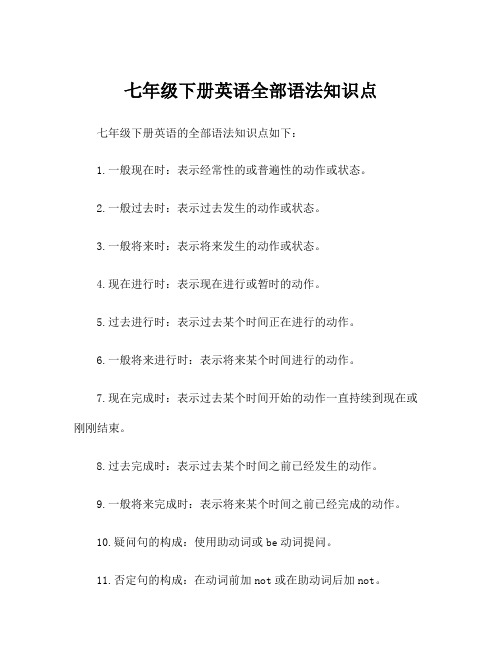
七年级下册英语全部语法知识点七年级下册英语的全部语法知识点如下:1.一般现在时:表示经常性的或普遍性的动作或状态。
2.一般过去时:表示过去发生的动作或状态。
3.一般将来时:表示将来发生的动作或状态。
4.现在进行时:表示现在进行或暂时的动作。
5.过去进行时:表示过去某个时间正在进行的动作。
6.一般将来进行时:表示将来某个时间进行的动作。
7.现在完成时:表示过去某个时间开始的动作一直持续到现在或刚刚结束。
8.过去完成时:表示过去某个时间之前已经发生的动作。
9.一般将来完成时:表示将来某个时间之前已经完成的动作。
10.疑问句的构成:使用助动词或be动词提问。
11.否定句的构成:在动词前加not或在助动词后加not。
12.肯定句的构成:直接陈述句子的内容。
13.比较级和最高级:用于比较两个或更多事物的形容词和副词。
14.表示数量的词汇:例如:all, most, some, any, few, a few, many, much等。
15.可数名词和不可数名词的用法。
16.单复数形式的变化规则。
17.形容词的用法和位置:用于修饰名词的词汇。
18.物主代词的用法:例如:mine, yours, his, hers, ours, theirs等。
19.反身代词的用法:例如:myself, yourself, himself, herself, ourselves, themselves等。
20.动词不定式的用法:用于表示目的、意图、结果等。
21.情态动词的用法:例如:can, could, may, might, must等。
22.介词的用法:表示位置、时间、原因、目的等。
23.祈使句的用法:用于发出命令、请求等。
24.从句的引导词和用法:例如:because, if, when, where, who等。
25.定语从句和状语从句的用法。
26.非谓语动词的用法:包括动词不定式、动名词和现在分词。
以上就是七年级下册英语的全部语法知识点。
七年级英语下册知识点总结

• 三. A ______ baby can only cry.
•
A. two month B. two months C. two-month-old D.two months old
• 四.Our school is
[在...对面]my house.
• Look, There is _______ over there. Do you know him?
•
My uncle will leave for the USA.
•
三.离开A地去B地: leave +A + for +B
•
My uncle will leave China for the USA.
• 九、stop 作名词时为“站” bus top
•
作动词时为“停止”,句型为:stop doing sth.停止正在做的事
• He is afraid of dogs.
• He is afraid of crossing the river. • [二]be afraid to do sth. 害怕做某事 He is afraid to go out at night.
• 七、He is like a father to me.
◆句型结构梳理
• 一、距离的表达法 • “A+be+距离+from+B”表示A地离B地有多远 • My home is about 一0 kilometers from school. • “be far away from” 表示离......多远,但是有具体的距离时则不要用far. • My home isn’t far away from the school. • His home is five kilometers away from the school.
七年级下学期英语各章节重要内容归纳

七年级下学期英语各章节重要内容归纳第一章:学校生活- 学科和教室- 学校设施和设备- 学校规则和制度- 课程时间表和课堂活动第二章:我的家庭- 家庭成员和亲戚关系- 家庭成员的职业和兴趣爱好- 家庭规则和家庭活动- 家庭成员之间的相处方式第三章:我的城市- 城市名称和地理位置- 城市景点和旅游景点- 城市交通和交通方式- 城市的文化和传统第四章:我的课余活动- 研究和爱好- 校外活动和俱乐部- 社交媒体和娱乐活动- 个人兴趣和追求第五章:购物和服装- 商店和市场- 购物的常用英语表达- 服装和时尚趋势- 参观商店和挑选服装第六章:健康和运动- 健康惯和饮食- 锻炼和运动方式- 平衡研究和休息- 保持健康的重要性第七章:节日和庆祝活动- 重要节日和传统俗- 节日庆祝活动和食物- 节日的意义和重要性- 节日庆祝的方式和惯第八章:环境保护- 环境问题和污染- 环境保护的重要性- 减少污染的方法和措施- 环境友好的生活方式第九章:世界各地的人们- 不同国家和地区的人们- 语言和文化差异- 人们的生活方式和传统- 尊重和理解不同文化背景的重要性第十章:未来的计划和梦想- 个人目标和职业梦想- 未来计划和学业规划- 实现梦想的方法和步骤- 努力和坚持的重要性以上是七年级下学期英语各章节的重要内容归纳。
每个章节都涉及不同主题,帮助学生了解和掌握相关的词汇和表达。
学生可以通过学习这些内容来提高英语水平和跨文化交流能力。
七年级下册英语知识点归纳总结

七年级下册英语知识点归纳总结七年级下册英语知识归纳1【重点短语】1. lost and found box 失物招领箱2. wele back 欢迎回来3. first of all 首先4. here is/are... 这有...5. from now on 从现在开始6. be careful with 小心保管7. whose bag 谁的包8. talk to sb. 与某人交谈9. mobile phone 移动电话,手机10. get on 上车 ( get off 下车)11. two thousand 两千 (thousands of 数以千计的...)12. look for 寻找13. at the moment 现在14. in a hurry 匆忙地15. alot of 许多,大量16. hundreds of 数以百计的17. on the train 在火车上18. every day 每天19. such as 例如20. make a list of 列一张...的清单21. ask/answer questions 问/回答问题【重点句型】1. Wele back to school! 欢迎回到学校!2. Whose bag is this? 这是谁的书包?3. It’s mine. 它是我的。
4. Are these crayons yours? 这些是你的蜡笔吗?5. Whose tapes are these? 这些是谁的磁带?6. Here’s a purple wallet! 这儿有个紫色钱包。
7. I think it’s Betty’s. 我认为它是贝蒂的。
8. Everyone, please be careful with your things from now on. 请大家从今以后仔细对待你们的东西。
9. People often lose things when they’re travelling or when they’re in a hurry. 当人们旅行或在匆忙中时,他们经常丢东西。
七下英语全书全部语法知识点总结

七下英语全书全部语法知识点总结Unit 1 Can you play the guitar?1. 情态动词+V原 can do= be able to do2. Play+ the+ 乐器+球类,棋类3. join 参加社团、组织、团体4. 4个说的区别:say+内容Speak+语言Talk 谈论 talk about sth talk with sb talk to sbTell 告诉,讲述 tell sb (not)to do sthTell stories/ jokes5. want= would like +(sb)to do sth6. 4个也的区别:too 肯定句末(前面加逗号)Either否定句末(前面加逗号)Also 行前be 后As well 口语中(前面不加逗号)7. be good at+ V-ing=do well in 擅长于be good for 对…有益(be bad for对…有害)be good to 对…友好(good 可用friendly,nice,kind替换)be good with和…相处好=get>8. 特殊疑问句的构成:疑问词+一般疑问句9. How/ what about+V-ing …怎么样?(表建议)10. 感官动词(look, sound, taste, smell, feel)+adj/ like11. 选择疑问句:回答不能直接用Yes或者No,要从中选择一个回答12. students wanted for school show(wanted表示招募,含有被动意义)13. show sth to sb=show sb sthgive sth to sb=give sb sth14. help sb (to)do sthHelp sb with sthWith sb’s help= with the help of sbHelp>15. be busy doing sth/ be busy with sth16. need to do sth17. be free= have time18. have friends= make friends19. call sb at +电话号码20.on the weekend= on weekends21. English-speaking students 说英语的学生(带有连词符,有形容词性质)22. do kung fu表演功夫Unit 2 What time do you go to school?1. 问时间用what time或者whenAt+钟点 at 7 o’clockat noon/ at night(during/ in the day)On+ 具体某天、星期、特指的一天on April 1st on Sunday on a cold winter morningIn +年、月、上午、下午、晚上2. 时间读法:顺读法逆读法:分钟≤30用pastfive past eight(8:05) half past eight(8:30)分钟>30用to a quarter to ten(9:45)整点用…o’clock 7 o’clock(7:00)3. 3个穿的区别:wear 表状态,接服装、手套、眼镜、香水等Put>Dress 表动作,接sb/>4. from…to…5. be/ arrive late for6. 频度副词(行前be后)Always usually often sometimesseldom hardly never7. 一段时间前面要用介词forfor half an hour for five minutes8. eat/ have… for breakfast/ lunch/ dinner/ supper9. either…or10. a lot of=lots of11. it is +adj+for sb +to do sth (adj修饰to do sth)It is important for me to learn English.it is +adj+of sb +to do sth (adj修饰sb)It is kind/ friendly/ nice of you to help me.12. 感叹句:How+adj+主谓!How+adj+a/an +n单+主谓!What+ a/an +adj+ n单+主谓!What+ adj+ n复/ 不可数+主谓!Unit 3 How do you get to school?1. 疑问词How 如何(方式)how long 多长(时间)答语常用“(For/ about +)时间段”how far多远(距离)答语常用“(It’s +)数词 +miles/ meters/ kilometers”how often多久一次(频率)答语常用“Always/ often/ every day/…”或“次数+时间”等表频率的状语How soon多快,多久以后,常用在将来时中。
七年级英语知识点归纳总结

七年级英语知识点归纳总结⿊发不知勤学早,⽩⾸⽅悔读书迟。
对于英语,我们需要把陌⽣的单词⽚语和句型语法不断的熟悉和熟练。
因此,重复重复再重复,熟练熟练再熟练,是学会英语的不⼆法门。
下⾯是⼩编给⼤家整理的⼀些七年级英语知识点的学习资料,希望对⼤家有所帮助。
⼈教版七年级下册英语知识点1、can+动词原形,它不随主语和数⽽变化。
(1)含有can的肯定句:主语+can+谓语动词的原形+其他。
(2)变⼀般疑问句时,把can提前:Can+主语+动词原形+其他?肯定回答:Yes,主语+can。
否定回答:No,主语+can't.(3)含有can的否定句:主语+can't+动词的原形+其他。
(4)含有can的特殊疑问句:特殊疑问词+can+主语+动词原形+其他?2、may+动词的原形。
(may为情态动词)⼀般疑问句是把may提前,肯定回答是:Yes,主语 +may。
否定回答是:No,主语+mustn't。
或please don't。
join+某个组织,俱乐部,party,参军,党派等 “加⼊”Join sb. “参加到某⼈中” join in (doing)sth “加⼊做......,参加某个活动” Join in=take part in +活动,⽐赛3、说某种语⾔:speak+语⾔4、play+球、棋、牌;play+the+乐器。
5、擅长于(做)什么:be good at +名词/动ing6、帮助某⼈做某事:help sb. (to ) do sth. help sb. with sth.7、我能知道你名字吗?May I know your name?8、想要做什么:want to do sth 例如:I want to learn about art.9、What club do you want to join?I want to join the chess club and the basketball club.10、What club does Tom want to join? He wants to join the swimming club .11、He can’t play the violin or the piano. Can you help kids with swimming?12、Why do you want to join the English club? Because I want to learn English well.七年级下册英语知识点1、what time和when引导的特殊疑问句。
- 1、下载文档前请自行甄别文档内容的完整性,平台不提供额外的编辑、内容补充、找答案等附加服务。
- 2、"仅部分预览"的文档,不可在线预览部分如存在完整性等问题,可反馈申请退款(可完整预览的文档不适用该条件!)。
- 3、如文档侵犯您的权益,请联系客服反馈,我们会尽快为您处理(人工客服工作时间:9:00-18:30)。
1. look (感官动词) 看起来,后面加形容词
His mother looks very young.
They look very cute.
Her dress looks very nice.
You look very cool in this coat.
2. by 介词
by 后面直接加表示交通工具的名词,中间不用任何词修饰,如:by bike
by +动词ing形式,表示通过某种方式
People show love to their mothers by giving cards.
You can be a good student by working hard.
5. 步行 on foot
6. 骑自行车 ride a bike/ ride bikes/ by bike / on a bike
7. 坐公交 by bus / take a bus
8. 坐地铁 by subway / take the subway / on the subway
13. Mr. Wang teaches ______(we) English. _____ of us like him.
14. How about ______(go) out with me?
15. Most students go to school _____ the school bus.
6. The early bird catches the work. (谚语) 笨鸟先飞
7. Work / Study must come first. 工作/ 学习必须放在第一位!
8. Classes begin at eight. =Class begins at eight.
提问: What time does the class begin? / What time do the classes begin?
20. 睡觉 go to bed
21. 早起 get up early
22. 回家 go home
23. 到家 get home
24. 去动物园 go to the zoo
25. 去公园 go to the park
26. 看电影 see a movie / film
27. 看电视 watch TV
50. 去划船 go boating
51. 球赛 a ball game / ball games
52. 一年四次 four times a year
53. 听音乐 listen to music
54. 读书 read books
55. 看报 read newspapers
56. 看医生 see a doctor
44. 打篮球 play basketball
45. 踢足球play soccer / football
46. 弹钢琴 play the piano
47. 弹吉他play the guitar
48. 拉二胡 play erhu
49. 去游泳 go swimming / go for a swim
27. They often go to school by bus in the morning. (对划线部分提问)
如果begin本身为分词,只能用begin to do sth
He is beginning to run.
5. listen to 听(动作) , hear 听见(结果)
6. always 反义词 never
7. 本话题涉及的时态为一般现在时,句中常有频率副词或表示频率的短语,如果主语为三单,动词一定要用三单!
38. 吃午饭 have lunch
39. 出去吃饭 eat out
40. 在校期间 on school days
41. 休息一会 have a short rest/ break
42. 午饭后 after lunch
43. 在某人的业余时间in one’s ( my/ his/ her/ their…)free/ spare time
33. 校园生活 school life
34. 一个美国学生 an American student
35. 在美国 in America / in the U.S.A.
36. 许多学生 many students/ a lot of students/ lots of students
37. 很少 very few
3. over (形容词)
School / Class is over.
4. begin
现在分词: beginning 过去式: began
begin to do sth , begin doing sth
He begins to write a letter. =He begins writing a letter.
63. 晚饭后 after supper
64. 吃饭 have dinner
65. 吃早饭 have breakfast
㈡重要句型
1. I usually come to school by subway.
同义句: I usually take the subway to school.
18. He ______ busy, so he has no time to play with us.
A. is always B. seldom is C. always is D. often is
19. The last class______(finish) at twelve o’clock.
57. 去图书馆 go to the library
58. 一周两次 twice a week
59. 见朋友 meet friends
60. 每天 every day
61. 在七点半 at half past seven
62. 一小会 for a little while / for a short time
8. What time _____ (be)school over?
9. Work must come ______(once).
10. It’s time ____you to get up.
11. We often _____ books in the morning.
12. Jill’s friend like ______(study) in our school.
28. 在晚上 in the evening / at night
29. 帮助父母 help parents
30. 做某人的家庭作业 do one’s ( my/ her/ his/ your/ their)homework
31. 在学校 at school
32. 知道,了解 know about / learn about
24. My mother goes shopping twice a week. (对划线部分提问)
______________________________________________________.
25. Mary always reads books in the library. (反义句)
5. In my class, forty of _______(we) go to school by bike.
6. The early bird ______ (catch) the worm.
7. Kangkang often _____ (ride) a bike to the park.
9. 坐飞机 by plane/ take the plane / on the plane
10. 坐小汽车 by car / in a car/ take a car/ drive a car
11. 坐轮船 by ship
12. 坐小船 by boat
13. 坐火车 by train / on the train
2. How do you usually/ often…?你通常/经常怎样…?
3. It’s time for class.=It’s time to have class. =It’s time for having class.
4. What about you? =How about you?
对划线部分提问: How do you usually come to school?
类似的有:
go to school by bike=go to school
on a bike= ride a bike to school=ride to school
go home by bus=go home on a bus=take a bus home
20. Let’s go______(boat).
21. It’s time to have breakfast. (同义句)
______________________________________________________.
22. Michael often rides a bike to school. (同义句)
_________________பைடு நூலகம்____________________________________.
23. I always go to work on foot. (对划线部分提问)
